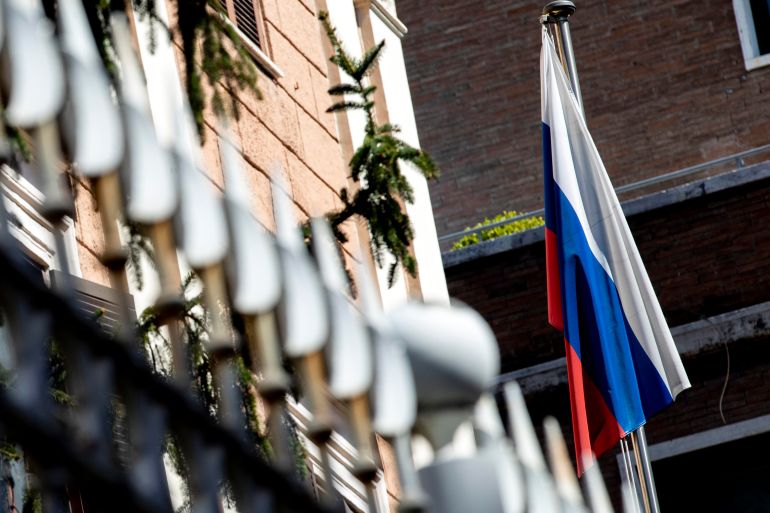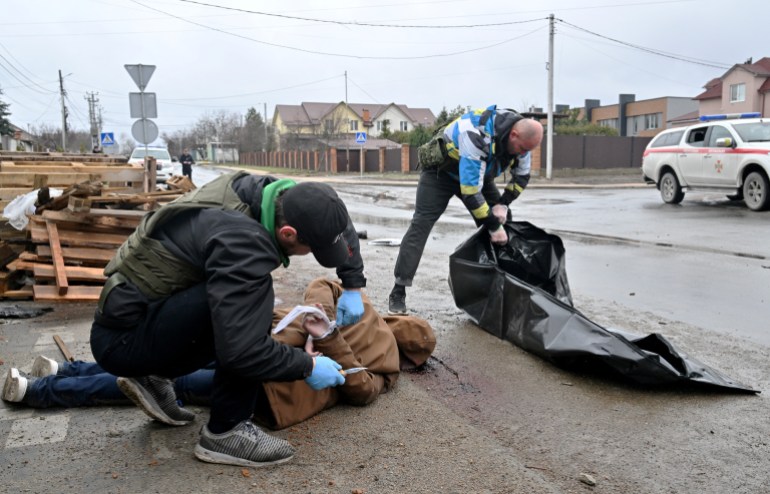EU countries expel dozens of Russian diplomats
Italy, Denmark, Spain and Sweden expel a total of more than 70 Russian diplomats in a new wave of anti-Moscow moves.

Italy, Denmark, Sweden and Spain have expelled a total of 73 Russian diplomats, prompting the Kremlin’s condemnation.
The Kremlin on Tuesday called the mass expulsions of Russian diplomats by a number of European countries a “short-sighted move” that will only complicate communication.
Keep reading
list of 2 itemsRussia expels two German diplomats in tit-for-tat move
“Narrowing down opportunities for diplomatic communication in such an unprecedentedly difficult crisis environment is a short-sighted move that will further complicate our communication, which is necessary to find a solution,” Kremlin spokesman Dmitry Peskov told reporters, referring to the Russian war in Ukraine.
“And this will inevitably lead to retaliatory steps,” he added.
Spanish foreign minister Jose Manuel Albares said on Tuesday his country was expelling about 25 Russian diplomats and embassy staff “who represent a threat to the interests and security of our country”.
Sweden will expel three Russian diplomats for spying, according to Foreign Minister Ann Linde.
Earlier on Tuesday, Italy’s Foreign Minister Luigi Di Maio said in a statement that his country ordered the expulsion of 30 Russian envoys for national security.
“The measure is in agreement with other European and Atlantic partners and is necessary for reasons linked to our national security and in the context of the current crisis caused by the unjustified aggression against Ukraine on the part of the Russian Federation,” Di Maio said.
Meanwhile, Denmark said it expelled 15 Russian “intelligence officers” posing as diplomats, giving them 14 days to leave the country.
“We have established that the 15 expelled intelligence officers have conducted spying on Danish soil,” foreign minister Jeppe Kofod told reporters after a meeting in parliament.
Denmark wished to send a “clear signal” that spying on it is “unacceptable”, he said.
Strong condemnation
Russia’s ambassador to Denmark was informed of the decision on Tuesday morning, where the government also expressed its condemnation of “Russia’s brutality against Ukrainian civilians in Bucha”.
“Deliberate attacks against civilians are a war crime,” it said.

At the same time, Copenhagen insisted on maintaining diplomatic relations with Moscow.
“Denmark does not wish to break diplomatic relations with Moscow. The Russian ambassador and the rest of the embassy in Copenhagen are therefore not included in the expulsion,” Kofod said.
Horrific images of corpses lying in the streets in the town of Bucha northwest of Kyiv, some with their hands bound behind them, following the Russian withdrawal have drawn international condemnation of Russia, and the EU is considering additional sanctions.
Moscow has denied responsibility, suggesting the images are fake or that the deaths occurred after Russian forces pulled out of the area.
But newly released satellite photographs taken by Maxar Technologies in mid-March, before the Russian withdrawal, showed what appeared to be bodies in some of the same places they were later found by Ukrainian troops and seen by journalists.
Latvia, Estonia
Also on Tuesday, Latvia and Estonia each ordered the closure of two Russian consulates and told staff to leave their countries. The number of the personnel was not specified.
“The decision was taken in solidarity with Ukraine in its fight against the unprovoked and unjustified military aggression and war started by Russia,” Latvian Foreign ministry said in a statement.
The consulates in the Latvian towns of Daugavpils and Liepaja and Estonian towns of Tartu and Narva will have to close by the end of April. Staff will have to leave by that time, the statements of the ministries said.
Tuesday’s developments came after a string of moves against Russian diplomats in other European countries as well as the United States.
On Monday, France expelled 35 Russian diplomats, and Germany announced it had expelled a “significant number” of Russian envoys.